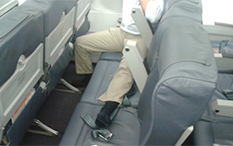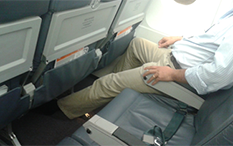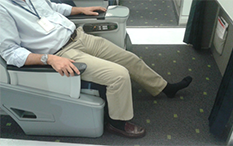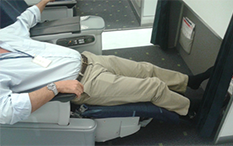Atualizado em 25 out. 2024

AVISO
O serviço de macas (SR STCR) foi restabelecido.
É considerado um caso médico quando um passageiro tem uma situação clínica em que depende de terceiros ou de assistência personalizada. Nestes casos, essa condição deverá ser comunicada à TAP que oferece as soluções adequadas.
CASOS QUE NECESSITAM DE AUTORIZAÇÃO MÉDICA PARA EMBARQUE
Solicite Autorização Médica para Embarque se o passageiro apresentar:
- Gessos ou talas de imobilização;
- Enfarte agudo do miocárdio recente ou outra doença cardíaca significativa (ex.: angina de peito, insuficiência cardíaca);
- Doença respiratória (ex.: bronquite, enfisema);
- Falta de ar, dor no peito ou cansaço anormal, ao andar e subir escadas;
- Acidente vascular cerebral recente;
- Doença infeciosa ativa ou contagiosa não tratada;
- Febre, tosse persistente, vómitos, sangramento;
- Manchas na pele ou erupção cutânea que possa estar relacionadas com doença contagiosa;
- Diabetes ou epilepsia, com internamento ou complicações recentes;
- Confusão mental, comportamento inapropriado, sugestivo de intoxicação por álcool ou drogas;
- Condição física ou comportamental que possa ser perigosa ou de desconforto para os outros passageiros, em termos de segurança de voo.
- Gravidez com complicações em geral, ou gravidez após as 36 semanas de gestação ou, se for múltipla (gémeos), após as 32 semanas;
- Internamento hospitalar recente;
- Cirurgia recente, em particular torácica, abdominal, craniana ou ocular;
- Necessidade de oxigénio extra ou outro equipamento médico a bordo;
- Necessidade de transporte em maca;
- Necessidade de cuidados médicos, de enfermagem ou paramédicos;
- Qualquer doença não controlada ou passível de ser agravada pela viagem;
Deve solicitar à companhia aérea uma Autorização Médica para Embarque (MEDIF).
Deverá entregar-nos, com pelo menos 72 horas de antecedência em relação ao voo, o impresso Medical Information for Fitness to Travel - MEDIF (Parte 2) (PDF, 0.1MB, PT) devidamente preenchido, datado e assinado pelo seu médico assistente. Todos os campos do formulário deverão estar preenchidos.
Este documento será depois analisado pela equipa médica aeronáutica da TAP. Será posteriormente informado se pode viajar e em que condições
É muito importante que os documentos sejam enviados à TAP com a antecedência devida:
- para o e-mail*: [email protected]
- ou em alternativa, para o fax nº (+351) 21 841 5880.
*este endereço de e-mail serve apenas para assuntos relacionados com o MEDIF, pelo que outras questões serão desconsideradas.
As reservas deste serviço têm de ser feitas até 72horas antes da viagem. Caso contrário, não podemos garantir a sua prestação.
GRÁVIDAS
As grávidas poderão viajar a bordo da TAP até às 36 semanas ou até 4 semanas antes da data prevista do parto para uma gravidez sem complicações, ou 32 semanas, no caso de gravidez de múltiplos (gémeos, trigémeos, etc) e sem complicações.
Antes de programar qualquer viagem de avião, as grávidas deverão inteirar-se das condições e riscos para a sua saúde do país para onde se deslocam!
- A partir da 28ª semana e até à 36ªa semana é necesário apresentar um certificado do médico assitente
- Será necessária autorização prévia do médico TAP nas seguintes situações de gravidez:
- de risco e alto-risco;
- com complicações;
- com mais de 36 semanas;
- de gémeos, trigémeos... com mais de 32 semanas;
- existência de dúvidas sobre o tempo de gestação e sobre a data prevista do parto;
- com previsão de complicações no parto;
- risco de aborto ou aborto recente.
Nos casos acima, o impresso MEDIF (Medical Information for Fitness to Travel) da TAP deve ser preenchido pelo médico assistente da passageira e enviado à TAP.
Depois deste documento ser analisado por um médico da TAP, a passageira será informada se pode viajar e em que condições. Serão efetuadas as diligências necessárias para o bem-estar e conforto da passageira grávida.
Recomendações úteis antes, durante e à chegada do voo
Antes do voo:
- A passageira deverá deslocar-se atempadamente para o Aeroporto para realizar todos os procedimentos de embarque e deslocações no Aeroporto de forma tranquila.
- Procurar reservar lugar junto ao corredor para ser mais fácil as deslocações aos sanitários e pequenos passeios, em particular nas viagens mais longas.
Durante o voo:
- A passageira deverá colocar o cinto de segurança (obrigatório) por baixo do abdómen na região pélvica de forma a não comprimir o útero.
- É desaconselhada a ingestão prévia ou durante o voo de bebidas gaseificadas e de leguminosas, que agravam a distensão dos gases a nível dos intestinos, podendo causar incómodo durante o voo.
- O ambiente de cabine é mais seco que em terra pelo que a grávida deve ingerir água frequentemente durante a viagem de avião.
- Para reduzir o risco de trombose venosa, em particular em viagens com duração superior a 3 horas, a grávida deve fazer exercícios no lugar mobilizando os membros inferiores.
- Não é recomendável a viagem dentro dos 7 dias após o parto; o mesmo se aplica aos recém-nascidos.
À chegada:
- Se houve cruzamento de mais de 3 fusos horários deverá tentar adaptar o organismo ao ritmo local, fazendo as refeições à hora do destino, expondo-se à luz solar e fazendo exercício moderado como por exemplo pequenas caminhadas. Assim, o relógio interno poderá sintonizar-se mais rapidamente.
- Na gravidez estão contraindicados os medicamentos para o jet-lag.
FRATURAS
O ambiente de cabine dos aviões comerciais corresponde a uma pressão atmosférica inferior à da superfície terrestre, o que não afeta significativamente a generalidade dos passageiros.
No caso de passageiros com determinadas condições de saúde pode haver um impacto relevante. Assim, para um passageiro que tenha sofrido recentemente lesão ortopédica dum membro inferior (ex. fratura) com necessidade de imobilização por gesso, deve ser solicitada autorização médica de embarque prévia à companhia aérea, através do preenchimento do
MEDIF pelo médico que o assistiu.
Para prevenir problemas circulatórios e desconforto, o gesso deverá ser aberto se viaja até 48 horas após a sua colocação; poderá ser necessário ainda cadeira de rodas para deslocação até ao avião e espaço para as pernas durante o voo, pelo que será necessário efetuar a reserva de
lugar(es) extra -EXST - para assim poder apoiar o membro fraturado durante a viagem.
A TAP não aplica legrests -LEGR/LEGL/LEGB
Aviões A319, A320 e A321
Passageiros com perna imobilizada abaixo do joelho.
- Até 3 horas de voo - Comprar um lugar extra: a perna imobilizada é colocada debaixo do assento extra ao lado do passageiro.
- Mais de 3 horas de voo - Comprar dois lugares extra: o passageiro ocupa o lugar junto à fuselagem e coloca a perna sobre os outros assentos. Se o membro afetado for o do lado esquerdo, o passageiro é aceite do lado direito. Se o membro afetado for o do lado direito o passageiro é aceite do lado esquerdo.

Passageiros com perna totalmente imobilizada, incluindo joelho
- Voo com qualquer duração - Comprar dois lugares extra: o passageiro encosta o tronco à fuselagem e coloca o membro imobilizado sobre os outros dois assentos. Se o membro afetado for o do lado direito o passageiro é aceite do lado esquerdo e vice versa.

Aviões A330 e A340
Passageiros com perna imobilizada abaixo do joelho.
- Até 3 horas de voo - Comprar um lugar extra numa fila lateral de dois lugares: a perna imobilizada é colocada debaixo do assento extra ao lado do passageiro.

- Mais de 3 horas de voo - Comprar um lugar em classe executiva, não sendo necessário lugar extra.

Passageiros com perna totalmente imobilizada, incluindo joelho
- Voo com qualquer duração - Comprar um lugar em classe executiva, não sendo necessário lugar extra.

MACAS
O transporte de macas nos aviões obedece a vários requisitos e depende da sua configuração.
- Será sempre feito em Classe Económica.
- Algumas aeronaves não comportam espaço adequado ao seu transporte, pelo que o transporte é sempre sujeito a disponibilidade de espaço da aeronave prevista para a operação;
Devido à reconfiguração da sua frota, a TAP atualmente tem um número limitado de macas em operação, pelo que o serviço de transporte deve ser solicitado e coordenado antecipadamente;
- As macas devem ser encomendadas com pelo menos 72 horas de antecedência. No entanto, no caso de pedidos excecionais de última hora, a TAP envidará todos os esforços para os satisfazer.
- Não são aceites reservas em lista de espera;
- Sempre que um passageiro viaja na condição de Caso Médico com maca, é obrigatório que o passageiro seja acompanhado por um médico ou paramédico;
- A confirmação final ao passageiro não pode ser dada sem uma resposta positiva da equipa médica da TAP após análise do MEDIF.
- A confirmação da maca será refletida no PNR com um SSR STCR a ser inserido pela nossa equipa dos Casos Médicos.
- Os voos codeshare estão sujeitos a condições especiais, por isso contacte as companhias aéreas operadoras antes de iniciar o processo de reserva. Este serviço pode ter ser reservado diretamente com a companhia operadora.
Na reserva tem de constar:
- Detalhes da ambulância nas escalas de partida/chegada (corporações/hospital de origem e destino);
- O contacto do passageiro ou acompanhante no local de embarque.
- Qualquer equipamento adicional solicitado pela TAP, o qual é providenciado pelo passageiro.
Taxas de serviço - novos valores aplicáveis desde 2 de maio 2019
- Equipamento Narrow Body (A319/A320/A321) - 6 x Tarifa Normal de Adulto em Classe Económica da Brand Plus
- Equipamento Wide Body (A330/A340) - 5 x Tarifa Normal de Adulto em Classe Económica na Brand Plus
- Y_PLU ou Y_PUI (exceto de/para Cabo Verde, Bissau, S. Tomé, Maputo e Luanda)
- B_PUI de/para Cabo Verde, Bissau, S. Tomé, Maputo e Luanda.
- O valor será cobrado e adicionado como "Q surcharge" na "fare calculation" do bilhete do passageiro.
- Ao passageiro e acompanhante será aplicada qualquer tarifa disponível em classe económica (desaconselha-se a emissão de Brand Discount que pela regra não é alterável).
- Não são cobradas taxas de aeroporto.
- Não são cobradas taxas de cancelamento ou no-show.
- Nalguns aeroportos será necessário um veículo elevador, no entanto o seu uso não será cobrado.
AMBULÂNCIAS
Sempre que haja necessidade de ambulância para efetuar o transporte até ao avião ou transferência de passageiro de um avião para outro , este serviço terá de ser providenciado pela agência/passageiro e será necessário inserir o máximo de informação detalhada e precisa no PNR, considerando:
- hospital ou centro de saúde de destino e contacto
- entidade responsável pela ambulância e contactos, por exemplo
- corporação de bombeiros ou empresa privada
- deve inserir um SSR AMBU, como por exemplo
- SSR AMBU- RED CROSS TEL +351 222 333 444
- deve indicar a pessoa ou entidade responsável pelo pedido da ambulância, pagamento e contactos, os quais devem incluir o endereço completo e o número de telefone
- assegurar a reconfirmação do transporte em ambulância.
NOTA - Aeroporto LIS: Desde 01 de março de 2021 a TAP deixou de providenciar o serviço de ambulância para transferência de passageiro de um voo para outro. Este serviço terá de ser providenciado pela agência/passageiro, sendo que a agência deverá fornecer as informações detalhadas e precisas no PNR, como descrito acima.
EXCEÇÃO - Aeroporto LHR: Sempre que exista um caso médico envolvendo o aeroporto de Heathrow (LHR), em Londres e a ambulância do aeroporto for solicitada, a reserva de STCR será confirmada somente após a TAP receber a confirmação de pagamento do EMD. Esta regra será aplicada para partidas ou chegadas ao aeroporto de LHR.
Aplica-se a seguinte taxa: Serviço de ambulância: 450 GBP (novo valor desde junho de 2021). O pagamento será feito por EMD-A AMBU
OXIGÉNIO
- A bordo existe sempre oxigénio para situações de emergência.
- No caso de um passageiro necessitar de oxigénio durante o voo, a TAP poderá providenciar este serviço contra o pagamento de uma sobretaxa;
- No entanto a confirmação final ao passageiro não pode ser dada sem uma resposta positiva da equipa médica da TAP após análise do MEDIF.
- O médico da TAP indicará qual o fluxo e tipo de garrafa adequado e se deverá viajar acompanhado; poderá ser autorizado que viaje sem acompanhante se estiver capacitado para administrar o oxigénio sozinho;
- O oxigénio é fornecido com uma máscara de tamanho único; não existem máscaras para crianças;
- Transporte de unidades de oxigénio do próprio passageiro não são autorizadas;
- Não são aceites tendas de oxigénio a bordo;
- A tripulação não está autorizada a fornecer oxigénio aos passageiros.
A TAP dispõe de 2 tipos de garrafas:
- grande: 3l/min / 7l/min;
- pequena 2l/min / 4l/min.
Taxas de serviço por One Way*
OXIGÉNIO
| Rota |
Oxigênio de Fluxo Contínuo |
Oxigênio de
Fluxo Não Contínuo |
| Voos Domésticos em Portugal Continental e Ilhas |
150 EUR
185 USD
235 CAD
|
80 EUR
100 USD
127 CAD
|
|
Voos Europeus (incluíndo Marrocos e Tunísia), Israel
e voos Acra-São Tomé e Principe/vv
|
170 EUR
211 USD
254 CAD
|
170 EUR
211 USD
254 CAD
|
|
Voos Intercontinentais
|
300 EUR
367 USD
466 CAD
|
300 EUR
367 USD
466 CAD
|
Será emitido um EMD-A não reembolsável para AOXY.
* em ligação só entre voos operados pela TAP/TAP Express.